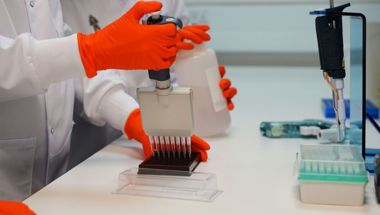
Using AI to help men on active surveillance for prostate cancer

Grant information
Reference: RIA24-ST2-015
Lead researcher: Dr Michela Antonelli
Institution: King’s College London
Award: £538,455
What you need to know
- This project uses artificial intelligence (AI) to help men on active surveillance feel more confident about delaying treatment.
- By combining scans, test results and medical history to build a detailed picture of a man’s cancer, the AI could help doctors decide who’s suitable for monitoring and spot early signs of cancer progression.
- This means each man’s follow-up can be better tailored to him, with fewer unnecessary tests, less stress, and quicker action if things change.
- More than 17,000 men a year in the UK could benefit from this more personalised, accurate monitoring.
Why are we funding this research?
Active surveillance is a way of keeping an eye on prostate cancer without jumping straight into treatment. It can be a good option for men with low-risk cancer, helping them avoid side effects from surgery or radiotherapy. But it’s not always easy. Many men worry about whether they’ve made the right choice, and whether their cancer might be changing without anyone noticing. Right now, the tools doctors use to monitor cancer – like blood tests, scans and biopsies – can be uncomfortable, stressful, and not always accurate on their own.
This research aims to change that. The team is building a new system using AI to bring together all the different bits of information about a man’s cancer – his scans, test results, medical history and more. By combining these into a detailed picture, the AI can help doctors make better decisions about who should be on active surveillance, how often they need tests, and when it’s time to switch to treatment.
It’s a smarter, more personalised way of monitoring prostate cancer, designed to reduce stress, avoid unnecessary procedures, and catch any changes early.
What will the researchers do?
To build their AI system, the researchers will follow a series of carefully planned steps over three years. First, they’ll create what they call a “multi-modal fingerprint” for each man on active surveillance. This fingerprint pulls together all the relevant information – scans, blood tests, biopsy results, medical history and more – into one detailed picture. It’s designed to reflect the unique features of each man’s cancer and overall health.
Next, they’ll train the AI to use these fingerprints to help doctors decide who’s suitable for active surveillance. This means moving away from general guidelines and towards decisions based on each man’s individual risk. They’ll also adapt an existing AI tool to better detect and track prostate cancer in men with early-stage disease, which is often harder to spot.
The team will then focus on monitoring. They’ll teach the AI to recognise subtle changes over time that might suggest the cancer is progressing. Based on this, the system will recommend how often each man should be checked – reducing unnecessary tests while making sure any worrying changes are caught early.
Finally, they’ll test the system using real-world data from hospitals in the UK and Italy, and work with men who’ve experienced active surveillance to make sure the tool is clear, useful and reassuring. The end goal is a practical, personalised system that doctors can use in everyday care.
This funding will advance our multidisciplinary research in pioneering an AI-driven system for personalising active surveillance. Our innovative approach, using state-of-the-art AI techniques, will help personalise patient selection for active surveillance, reduce unnecessary biopsies and ensure timely interventions, enhancing the quality of life and clinical outcomes for thousands of men with prostate cancer.
How will this benefit men?
Right now, many men face uncertainty – wondering if their cancer is changing, whether they’re being monitored often enough, or if they’re having too many tests that might not be needed. This can be stressful and confusing.
By using AI, the researchers aim to take away some of that guesswork. Their system could help doctors understand each man’s cancer in more detail, so they can better tailor his care to him. That would mean fewer unnecessary biopsies and scans, and more confidence that any changes will be spotted early.
It could also mean men feel more reassured about their decision to delay treatment, knowing that their cancer is being watched closely and intelligently. In short, this research could lead to smarter, safer monitoring – giving men peace of mind and helping doctors make better decisions at every step.
Help us fund more research like this
Your donation helps us fund lifesaving research into improving the way we diagnose and treat prostate cancer.





